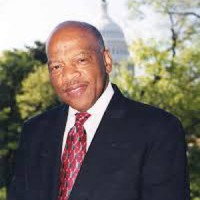John Lewis: Peace inspires positive change
By Kerri Rae Hinman
John Lewis has been arrested, beaten and nearly killed in the name of peace. But the Congressman from Georgia refuses to be bitter, for that would get in the way of loving his fellow man, his preferred way of living.
Quoting his good friend Dr. Martin Luther King Jr., Lewis said that “Hate is too big of a burden to bear.”
Adding he is a firm believer that peace is the only way to inspire change, Lewis said, “It is better to love. It is better to love everybody.”
Lewis was the keynote speaker at a ceremony to celebrate the 50th anniversary of the 1964 Civil Rights Act. The ceremony was before a large audience at Renaissance Coliseum on the campus of Bradley University. Other speakers included retired U.S. Secretary of Transportation Ray LaHood, who served as emcee, and Lewis’s congressional colleagues, U.S. Reps. Aaron Schock, Cheri Bustos and Robin Kelly.
Lewis grew up in rural Alabama, 50 miles from Montgomery. He remembers as a child being inspired by Dr. Martin Luther King Jr. to get in “good trouble” or “necessary trouble.”
“You need to speak up, speak out, and work together with others to bring about change to make it right”, he said.
Lewis became a leader in the Civic Rights movement, beginning while he was a student in college. He organized silent, non-violent sit-ins where people spat on him and fellow protesters, bullied them, and even beat them. Lewis was arrested for the first time in 1960 during a non-violent protest for “disturbing the peace.” He was arrested more than 40 times during the 1960s for his various non violent protests.
He is not bitter, he said, despite the fact his bus was fire-bombed at a Greyhound bus station in 1965, or despite nearly dying after being hit over the head with a wooden crate during the Selma to Montgomery march, which also was known as Bloody Sunday.
Lewis, who went through several campaigns before he was finally elected to the Atlanta City Council in 1981 and then to congress in 1986, said the Civil Rights Act was significant in our country’s history.
“We live in a different country and in a better country because people came together,” Lewis said of the signing of the Act. But he said work still remains to be done.
Lewis illustrated the importance of the world coming together to fight for the common good by telling the story of a house his aunt used to live in; a “shotgun house” that had holes and a tin roof. One afternoon while Lewis and his brothers, sisters and cousins were playing in the backyard together a storm blew up. The wind was blowing, lightning was flashing and the rain was beating down on the tin roof and his aunt was afraid the house would get blown away from its weak foundation.
“We never left the house. We must continue to hold each other,” he said. “Can’t we come together and just be human? Can’t we just get along to make everything strong? America is one family living in the same house, despite our differences. We need to learn to work together for the common good.”
Lewis said it doesn’t matter whether we’re black, white or Latino; straight or gay; Democrat or Republican. We all live in the same house and that should be the message as we celebrate and commemorate the passage and the signing of the 1964 Civil Rights Act.
Several of the other speakers agreed how important it is today that our leaders from both parties in Washington, D.C, set their differences aside and work together to find common ground for the good of the people.
“Who am I to hold a grudge? Who are you to hold a grudge,” said Schock, who has become good friends with Lewis while in Congress. “I have never been through the tests of John Lewis. And yet, he has forgiven them all and remains so positive about life and his opportunities”.
Bradley President, Joanne Glasser noted that Lewis has been known as “A conscience of the U.S. Congress.” He has been awarded the Presidential Medal of Freedom in 2011, the highest honor granted to any civilian.
“We need to learn to treat each other better,” said Brad McMillian, head of the Institute for Principled Leadership in Public Service at Bradley.

